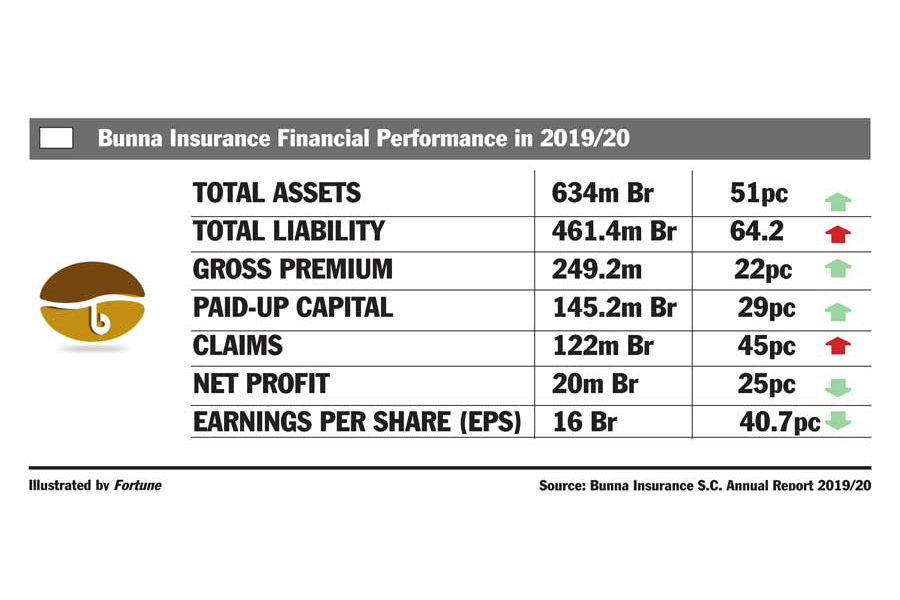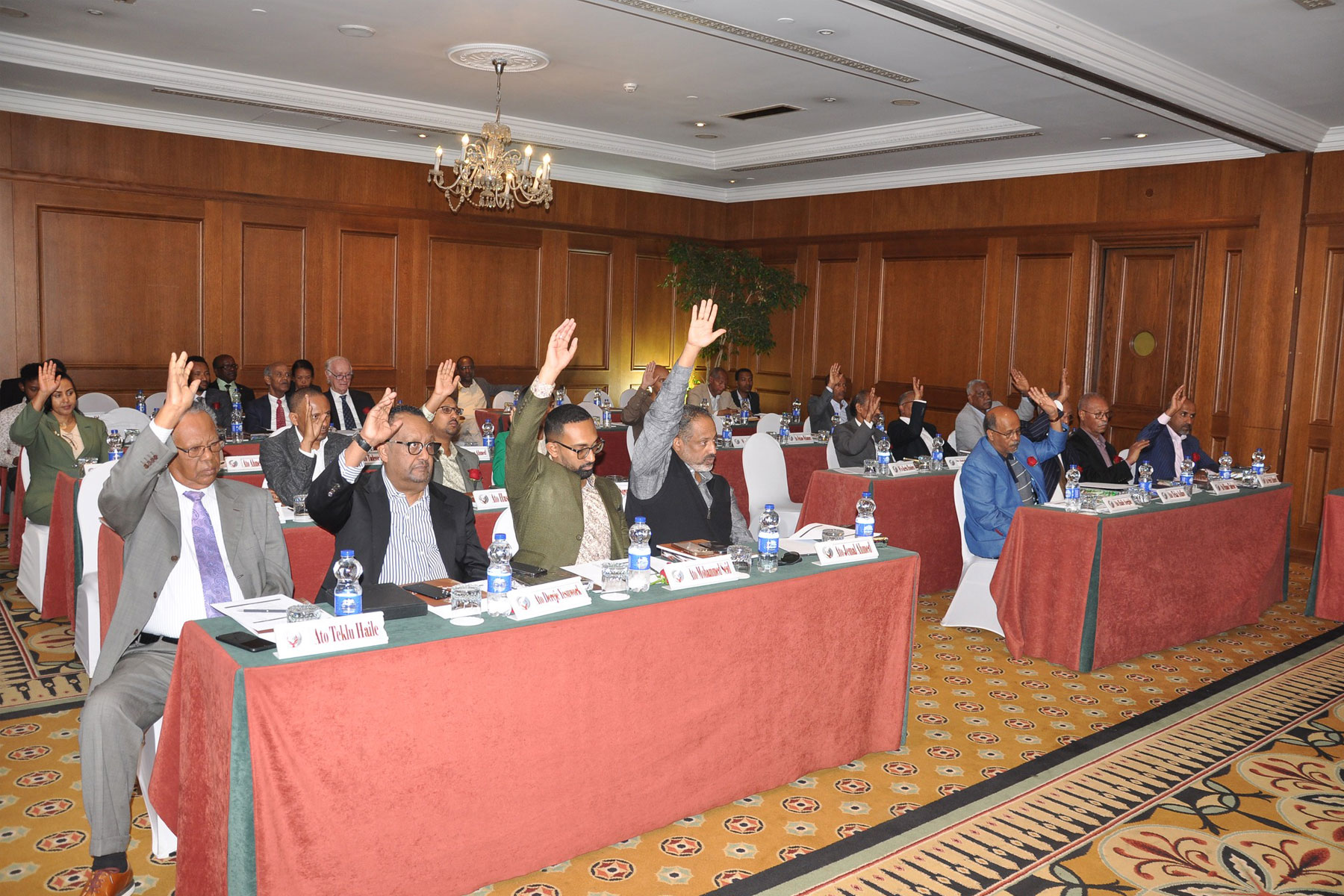
Radar | Jul 28,2025
Jan 7 , 2022
By Asseged G. Medhin
Both the insurable and insurers in the financial sector have developed myopia. Only a few policies are issued different from the most traditional ones. Finding dynamism has been challenging, writes Asseged Gebremedhin, an insurance professional with over a decade of experience in finance.
There is no more a convenient period for companies, investors, NGOs, individuals and government enterprises to ensure that their properties and ventures are insured. It is mainly because of the ever-changing risk factors and cost of managing losses.
One of the subjects that interest many insurance experts is that the share of insurance development and penetration in the overall economy is minimal. At the same time, the need for it is latent.
Most people argue that it is due to a lack of experts in the industry and the degree of awareness of the general public. Still, others argue that only regulatory reforms will change the landscape of the insurance industry. In any case, the status quo has allowed the industry to sit back and await changes with the fraction of the share in the financial sector as banks.
Both the insurable and insurers have thus developed myopia. Only a few policies are issued different from the most traditional ones. It is challenging to find dynamism in the sector.
Some researchers point out that the reason businesses and people do not seek insurance to protect their assets, liability or lives is mainly because of the insurers themselves. Similar policies, repeated service delivery, limited problem-solving capacity, and lack of breakthroughs are mentioned as factors.
Recently, novel products to the industry such as interest-free banking and Takaful have been introduced, offering services to communities that have for the large part been ignored previously. This breakthrough is because more effort was made to clear marketing myopia and apply design thinking, seeing things from the perspective of customers.
Such effort needs to be applied furthermore to identify gaps and address them. The external environment is indeed changing beyond the industry’s appetite. More banks, insurers and microfinance institutions are coming, hopefully with fresh dynamism, technology and capable human resource, especially in leadership roles. On the other hand, the force of regional markets will push archaic services whether insurers are ready or not.
I recently ran a modest poll on my social media accounts asking whether insurance policies are sold by insurers or sold by customers. A few answers stated that compulsory insurance (such as third-party motor liability) is “sold” and the rest is “bought.” Others answered (especially insurance professionals, but there were also some customers as well) that insurance policies are sold all the time. There were quite a few that said that insurance is purely ‘bought’ by customers.
One of the reasons for not being able to get more insurance market penetration is that there is no common view of developing the sector professionally. Every business wants a customer’s money. But “the wallet” is limited and the customer is hit by all sorts of marketing from various other industries. However, the customer's wallet is not that affected by insurance premium but traditional solutions and service delivery, special claims processes, and unscrupulous games.
Just like Maslow’s pyramid of basic needs, insurance has to be depicted in the mind of potential customers who own businesses and property as necessary. Insurance is not a luxury: it is a basic need of the general public as protection from loss is rudimentary.
The industry's leadership needs to work on human capital and marketing as the core area of operations to advance this idea. Marketing is a core area of insurance companies in the world but not so in Ethiopia. Growth will never be achieved without properly getting the word out.
Alternative insurance services, such as Takaful and its backward linkage IFB, can also eradicate marketing myopia and create the groundwork for empathising with the needs of customers.
PUBLISHED ON
Jan 07,2022 [ VOL
22 , NO
1132]


Radar | Jul 28,2025

Fortune News | Nov 29,2020

Fortune News | Oct 30,2021

Radar | Aug 01,2020

Viewpoints | Jul 31,2021

News Analysis | May 18,2024

Fortune News | Dec 21,2019

Fortune News | May 27,2023

Commentaries | Sep 27,2020

Viewpoints | Apr 03,2021

Photo Gallery | 176240 Views | May 06,2019

Photo Gallery | 166454 Views | Apr 26,2019

Photo Gallery | 156929 Views | Oct 06,2021

My Opinion | 136888 Views | Aug 14,2021

Dec 22 , 2024 . By TIZITA SHEWAFERAW
Charged with transforming colossal state-owned enterprises into modern and competitiv...

Aug 18 , 2024 . By AKSAH ITALO
Although predictable Yonas Zerihun's job in the ride-hailing service is not immune to...

Jul 28 , 2024 . By TIZITA SHEWAFERAW
Unhabitual, perhaps too many, Samuel Gebreyohannes, 38, used to occasionally enjoy a couple of beers at breakfast. However, he recently swit...

Jul 13 , 2024 . By AKSAH ITALO
Investors who rely on tractors, trucks, and field vehicles for commuting, transporting commodities, and f...

Oct 18 , 2025
The political establishment, notably the ruling party and its top brass, has become p...

Oct 11 , 2025
Ladislas Farago, a roving Associated Press (AP) correspondent, arrived in Ethiopia in...

Oct 4 , 2025
Eyob Tekalegn (PhD) had been in the Governor's chair for only weeks when, on Septembe...

Sep 27 , 2025
Four years into an experiment with “shock therapy” in education, the national moo...

Oct 18 , 2025 . By NAHOM AYELE
In a sweeping reform that upends nearly a decade of uniform health insurance contribu...

A bill that could transform the nutritional state sits in a limbo, even as the countr...

Oct 18 , 2025 . By SURAFEL MULUGETA
A long-planned directive to curb carbon emissions from fossil-fuel-powered vehicles h...

Oct 18 , 2025 . By BEZAWIT HULUAGER
Transaction advisors working with companies that hold over a quarter of a billion Bir...